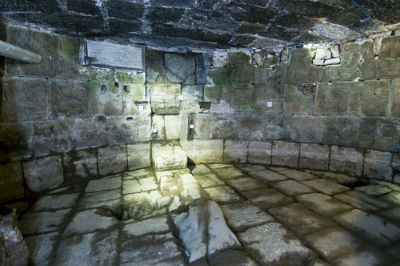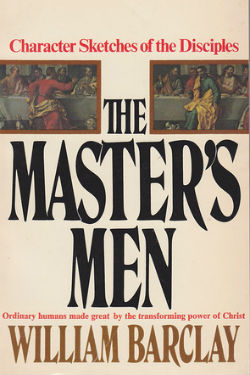 Rome's Mammertine Prison where Peter may have ended his days.
Rome's Mammertine Prison where Peter may have ended his days.By Neil Earle
One biblical character we can all relate to – Simon Bar Jonah, known to us as Peter.
He strides across the Gospel record in all his marvelous complexity and inconsistency. Peter the self-styled defender and upholder of Jesus to the bitter end. Peter the one who dared correct the master. Peter the slow to grasp but the quick to move to the front of the band. Impulsive and devoted, irrational and insightful, unpredictable and stubborn, zealous and bullying, outspoken and yet silent too often when it counted – Peter was a man like most of us.
 Rome's Mammertine Prison where Peter may have ended his days.
Rome's Mammertine Prison where Peter may have ended his days.Oh, yes, we can all relate to Peter. His restoration and rehabilitation by his Lord and Master can inspire us all.
Peter was a Galilean from the north in Israel. A Jewish writer said these outdoorsy folks were quick in temper but chivalrous by nature. The Jewish Talmud said of these robust folk: “They were ever more anxious for honor than for gain.” As William Barclay said of Peter: “Quick-tempered, impulsive, emotional, easily roused by an appeal to adventure, loyal to the end – Peter was a typical Galilean.”
The first 12 chapters of the fast-moving Book of Acts sketched Peter’s prominent position among the early Christians. It is Peter who moves to elect a new apostle to replace Judas (Acts 1:15). Peter was the spokesman for the little band on that first sermon on the Day of Pentecost (Acts 2). Peter and John’s faith in their Lord guiding them healed a well-known invalid at the Temple, drew a big crowd and defied the Jewish leaders when arrested (Acts 4:1-22). 5000 people came to Christ because of these striking events.

It was Peter who went to Samaria to secure the cause of the Gospel in that unlikely mission field and it was he who confronted the wily magician Simon Magus (Acts 8:12-25). Peter’s rebuke caused two conspirators to fall dead (Acts 5:1-11). Peter raised a dead widow to life (Acts 9:32-43). But perhaps his greatest contribution to church history was baptizing a Roman officer into the church – a bold move that caused him criticism in the early Jewish-based church. God used him to open the door of faith to the Gentile world (Acts 10, Acts 15:7-11).
Peter. Peter. Peter. He bestrides the early church lie a converted colossus. Most incredibly of all people felt that even his shadow could heal the sick in the streets of Jerusalem (Acts 5:15).
But as we have seen he wasn’t always that way. In that gloomy night in Gethsemane when the police came to arrest Jesus Peter impulsively cut off a servant’s ear with a misplaced sword thrust. Later he realized this violent act made him a marked man. It could cost him his life. So he “followed after Jesus.” Luke 22:54-62 skillfully sketches Peter’s denial of his Lord – three times as Jesus had predicted. After his third denial of even having known Jesus complete with cursing (Matthew 26:72), Luke simply records, “Jesus looked at Peter.” Then it finally struck home with Peter of how unsteady and unready he really was. It says simply he went out and wept bitterly.”
But in that moral defeat was both the breaking and making of Peter.
Peter had a major life problem. It is one we all have to one degree or another. Peter suffered from an inordinate case of pride, of self-reliance, of overweening confidence in his own human abilities and opinions. 1 John 2:16 warns us against how much ugly pride motivates our actions. Other texts show that this silent killer can sneak up on us and upset our best intentions (1 Corinthians 13:1-3). It happened to Peter. It can happen to us.
As we approach the Passover-Easter season and prepare to partake of the bread and wine at Easter Communion we are called to examine ourselves for this deeply-rooted malaise (1 Corinthians 11). Our silent killer can be spotted best when we analyze its hideously different aspects. There at least four of these we can point out to today.
First, the pride of physicality. Peter was a sturdy fisherman who probably headed up the partnership of two sets of brothers along the shores of Galilee. I grew up around fishermen – they can be very tough and outspoken and don’t use silk handkerchiefs. Peter was the man people tended to follow. He enjoyed the rough and tumble of life. We see that in Luke 5:1-11 when Jesus asked him to cast out their nets for a catch. Peter was the one who protested – “Hey, we’ve been at this all night and done nothing.” But, as usual he relented at Jesus’ request and the sudden great haul of fish left him stupefied and emotionally off-kilter. This up-and-down trait would stay with him and it probably traced to his supreme confidence in himself – a trait Jesus would help him replace with godly faith.
This second aspect is called intellectual pride. It is mentioned in 1 Corinthians 8:1 where we are told knowledge puffs up. It does. Peter like many of the Jewish people who followed Jesus thought they had it all figured out. Jesus was clearly the expected Messiah so it was only natural that he would fulfill the prophecies of national greatness and appointing them as chief leaders in the Kingdom their prophets had forecast.
There was always this tension among them about who would be greatest in the Kingdom. Jesus had whetted their appetites promising them twelve thrones in the future. What they didn’t know was that this was a distant future. Right now, Jesus would be established as the Messiah for fulfilling the role of the Suffering Servant (Isaiah 53), Peter, like all the other disciples, missed that subtlety. He thought he had it all figured out. He rejected information from Jesus himself that contradicted that (Mark 8:31-33). Peter resisted Jesus about that. This earned him the rebuke, Get behind me Satan.
Peter was wrong. He was deceived about what information he had. He added up 2 and 2 and got 22, like so many of us do.
So on the very night Jesus was arrested those so-called loyal disciples were arguing about who would be the greatest in the kingdom. They had no idea of what a horrible three days awaited them. Peter was foremost of those blinded disciples who refused at first to let Jesus wash his feet as an act and example of humility (John 13). The pride of knowledge can do that. It shows up when we think we “know it all” when we hear a sermon or carry out an act of worship. It’s important to spot this, its part of the deadly pride we carry around inside us.
Peter and the first disciples had encountered pride of position when they bristled with anger at James and John’s mother for asking for the top spots next to Jesus in the kingdom. They bristled because they thought it should have gone to them. Peter was the acknowledged leader of the group by force of personality so it bothered him that Jesus seemed to have special affection for John (John 21:20-22). This kind of “politics among Christians” is endemic in the church. It is responsible for some of the worst mistakes made by the Christian church across history. Popes and kings clashed for control in the Middle Ages, Anglicans and Presbyterians killed each other in the 1600s and some extreme Protestants even today harbor deep suspicions against Catholics down to now.
There is something in the fact that religion, which is ostensibly about getting close to the infinite, being in touch with ultimate things, can degenerate in our minds to “I love God better than you do, so I’m closer to him than anyone else.” Thus pride of position often morphs into pride position number four, the pride of liturgy. The Western and Eastern churches had many divisions over the years and one of them was over whether to use leavened or unleavened bread in the communion. These splits hurt the reputation of the church across history because the average person looks on and sees this dispute as revolving around “my wafer is better than your wafer.” Even today some Protestant groups do communion once a week, some once a month and some refuse to do it at all because it symbolized a unified body which, they say, doesn’t fit the facts.
In 1 Timothy 3:6 churches are warned not to ordain someone new in the faith because they could be “conceited and fall under the same judgment as the devil.” This reference to the devil would seem to make pride the “original sin” since it caused the devil to be so puffed up in his own estimation as to set himself up in opposition to God’s plan. He just couldn’t resist being his own master.
Pride is just that serious. It causes us to overestimate our own abilities. Or it feeds a deep desire to feel good about ourselves by exalting ourselves over others. God hates pride because he knows it can distort our relationship with him and others (Proverbs 6). Peter had a good dose of it, as do we all. Pride can deceive us into the ultimate spiritual trap of doing right things for the wrong reasons. We are warned that we could even deliver our bodies to be burned as an act of secret pride, just to show others how righteous we are.
This is rank spiritual immaturity and woeful blindness for a major reason. Every experienced Christian knows that it is not how we look in the sight of men that will justify us at the Judgment. No. It all depends on what God thinks of us, not what other people in the around think. Once we see that we are able to make real progress in the Christian life.
That was the secret of Peter’s miraculous service in the Book of Acts. He got the point. The incident on the night of Jesus’ arrest broke the old Peter apart at last. He went out and wept bitterly because he was vomiting up at last that toxic brew called the pride of life. The old Peter was dealt an almost fatal blow. He still had distance to cover but he had reached his life’s turning point. William Barclay puts it poetically:
“Peter may have had many faults but Peter had always the saving grace of the loving heart. F.W. Farrar says of him that his greatest characteristic was that, however often he might fall and fail, ‘he always recovered his courage and his integrity.’ Luke ends his story of Peter’s denial with a vivid and dramatic sentence; ‘The Lord turned and looked upon Peter.’ One look from the eyes of Jesus could always bring Peter back to the way of honor and fidelity” (The Master’s Men, page 24-25).
So may it be said of us. As we approach the memorial of Jesus’ sacrificial death let us remember that, like Peter, in our breaking can come our making. Thank God for Peter’s example and the love of a patient, farseeing Master.